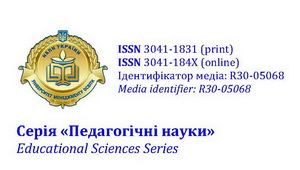Esp teachers methodological competence improvement main aspects
Анотація
Ключові слова
Повний текст:
PDF (English)Посилання
REFERENCES / СПИСОК ВИКОРИСТАНИХ ДЖЕРЕЛ
O. Alexander, «Exploring teacher beliefs in teaching EAP at low proficiency levels», Journal of English for Academic Purposes, is. 11, рр. 99–111, 2012. https://doi.org/10.1016/j.jeap.2011.12.001
G. Ferguson, «Teacher education and LSP: The role of specialised knowledge», in Teacher Education for ESP; R. Howard, G. Brown, Eds. Clevedon : Multilingual Matters, 1997, рр. 80–89.
D. R. Hall, «Teacher education in languages for specific purposes», in Encyclopedia of Applied Linguistics. C. A. Chapelle, Eds. Oxford : Blackwell Publishing, 2013, рр. 5537–5542.
R. R. Jordan, «EAP: The human dimension – Changes, difficulties & needs», IATEFL ESP SIG Newsletter, is. 17, рр. 17–21, 2000.
P. Master, «ESP Teacher education in USA», in Teacher Education for ESP; R. Howard, G. Brown, Eds. Clevedon: Multilingual Matters, 1997, рр. 22–40.
P. Master, «English for Specific Purposes», in, Handbook of Research in Second Language teaching and Learning; E. Hinkel, Eds. Mahwah N.J. : Lawrence Erlbaum Associates, 2005, рр. 99–115.
T. Dudley-Evans, M. J. St John, Developments in ESP. A multi-disciplinary approach. Cambridge : Cambridge University Press, 1998.
D. Belcher, «English for Specific Purposes: Teaching to perceived needs and imagined futures in worlds of work, study, and everyday life», TESOL Quarterly, vol. 40, is. 1, рр. 133–156, 2006. https://doi.org/10.2307/40264514
L. Woodrow, Introducing Course Design in English for Specific Purposes. London, Great Britain : Routledge, 2017. https://doi.org/10.4000/asp.8222
А. П. Болотнікова, «Граматичні індикатори вираження категорії ввічливості в українській мові», дис. канд. наук; Запорізький Національний ун-т. Запоріжжя, 2018.
S. Y. Bolotnikov, «Formation of linguocultural competence of future english language teachers», Актуальнi питання гуманiтарних наук: міжвуз. зб. наук. праць молодих вчених Дрогоб. держ. пед. ун-ту ім. Івана Франка. т. 3, вип. 76, с. 30–35, 2024. https://doi.org/10.24919/2308-4863/76-3-5
TRANSLATED AND TRANSLITERATED / ПЕРЕКЛАД, ТРАНСЛІТЕРАЦІЯ
O. Alexander, «Exploring teacher beliefs in teaching EAP at low proficiency levels», Journal of English for Academic Purposes, is. 11, рр. 99–111, 2012. https://doi.org/10.1016/j.jeap.2011.12.001 (in English).
G. Ferguson, «Teacher education and LSP: The role of specialised knowledge», in Teacher Education for ESP; R. Howard, G. Brown, Eds. Clevedon : Multilingual Matters, 1997, рр. 80–89. (in English).
D. R. Hall, «Teacher education in languages for specific purposes», in Encyclopedia of Applied Linguistics. C. A. Chapelle, Eds. Oxford : Blackwell Publishing, 2013, рр. 5537–5542. (in English).
R. R. Jordan, «EAP: The human dimension – Changes, difficulties & needs», IATEFL ESP SIG Newsletter, is. 17, рр. 17–21, 2000. (in English).
P. Master, «ESP Teacher education in USA», in Teacher Education for ESP; R. Howard, G. Brown, Eds. Clevedon: Multilingual Matters, 1997, рр. 22–40. (in English).
P. Master, «English for Specific Purposes», in, Handbook of Research in Second Language teaching and Learning; E. Hinkel, Eds. Mahwah N.J. : Lawrence Erlbaum Associates, 2005, рр. 99–115. (in English).
T. Dudley-Evans, M. J. St John, Developments in ESP. A multi-disciplinary approach. Cambridge : Cambridge University Press, 1998. (in English).
D. Belcher, «English for Specific Purposes: Teaching to perceived needs and imagined futures in worlds of work, study, and everyday life», TESOL Quarterly, vol. 40, is. 1, рр. 133–156, 2006. https://doi.org/10.2307/40264514 (in English).
L. Woodrow, Introducing Course Design in English for Specific Purposes. London, Great Britain : Routledge, 2017. https://doi.org/10.4000/asp.8222 (in English).
A. P. Bolotnikova, «Hramatychni indykatory vyrazhennia katehorii vvichlyvosti v ukrainskii movi», dys. kand. nauk; Zaporizkyi Natsionalnyi un-t. Zaporizhzhia, 2018. (in Ukrainian).
S. Y. Bolotnikov, «Formation of linguocultural competence of future english language teachers», Aktualni pytannia humanitarnykh nauk: mizhvuz. zb. nauk. prats molodykh vchenykh Drohob. derzh. ped. un-tu im. Ivana Franka. t. 3, vyp. 76, s. 30–35, 2024. https://doi.org/10.24919/2308-4863/76-3-5 (in English).
Посилання
- Поки немає зовнішніх посилань.
